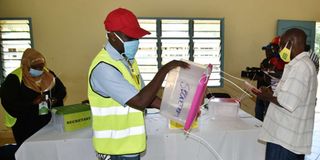FKF should invite IEBC in the next elections

The Football Kenya Federation (FKF) Electoral Officials prepare ballot boxes during the Mombasa Branch Elections at Shanzu Teachers College on September 19, 2020.
Football Kenya Federation (FKF) president Nick Mwendwa is serving his second and final term. The next elections are slated for October. FKF will convene its Annual General Delegates Meeting on March 16 to ratify and adopt the election code.
Notably, a significant change this time around is that counties will function as individual branches. In previous polls, multiple counties formed a single branch, such as Tana River County, Lamu County, and Kilifi County comprising the North Coast Branch.
This adjustment means that each county will now have its own FKF officials responsible for overseeing all football activities within the county.
Traditionally, the FKF establishes an Election Board to manage the election process. However, this board, based at the Nairobi Headquarters, primarily oversees the presidential poll. The president is elected by delegates who, in turn, are elected by branch officials.
Aspirants typically play a pivotal role in the Branches and Sub-Branches elections. Unfortunately, there have been instances where candidates who did not emerge victorious were erroneously declared as winners. Drawing inspiration from the Law Society of Kenya (LSK), FKF could consider adopting a similar approach.
LSK had the option to create its Election Board but opted to engage the Independent Electoral and Boundaries Commission (IEBC) to conduct its polls nationwide. The FKF Election Board, by its nature, might not ensure a truly free, fair, and transparent election, as it involves individuals with potential conflicts of interest. An independent body is crucial for delivering an election that is both transparent and verifiable.
Given that the IEBC already has offices and officers at the constituency level, FKF could streamline its election process by submitting the list of eligible and active clubs and club officials to IEBC offices at constituencies and counties.
These offices would then facilitate the election at the county level, with the winners proceeding to elect FKF leaders. To ensure the integrity of the process, it is suggested that the Ministry of Sports at the national level, County Sports departments, CAF, Fifa, and other relevant bodies send observers to monitor the elections, ensuring they are free, fair, and transparent.
As we anticipate new leadership at Kandanda House, it is imperative that the new officials prioritise serving the football fraternity rather than their personal interests.
Fredrick Matiba, Tana River




